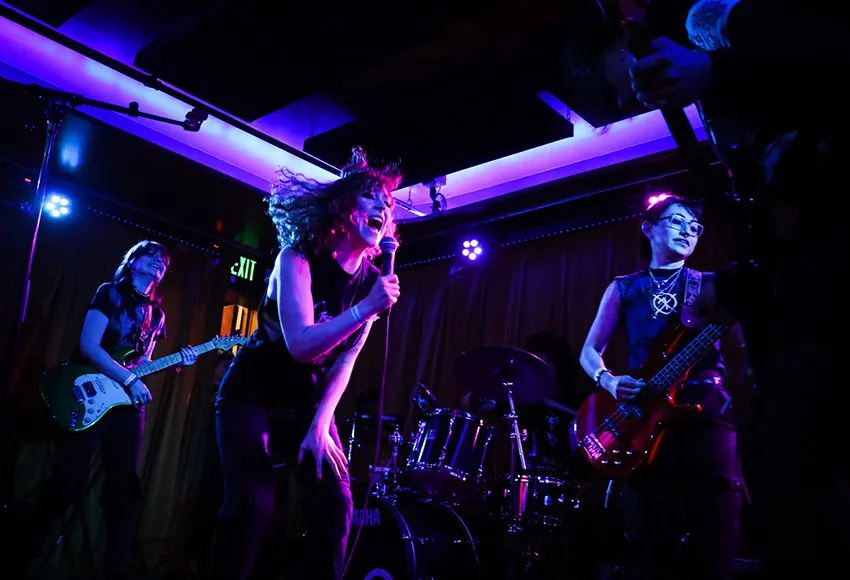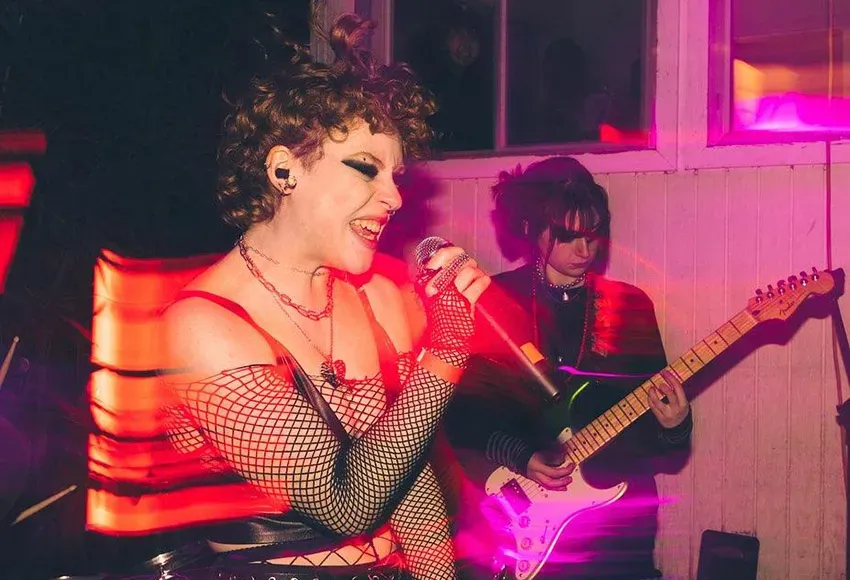For decades, Seattle has been known as the birthplace of iconic bands. Pearl Jam, Nirvana, and Alice in Chains all started on the streets of the Emerald City, sharing meaningful lyrics about dismantling abusive power structures and changing the world.
Today, the Seattle punk scene is transforming, thanks to a revolutionary new band known as Gender Envy, a Queer and Trans punk band making waves across the city.
The group screamed their way into the hearts of the Trans community as headline performers at Volunteer Park's Trans Day of Visibility protest. Kids of all ages looked toward the stage with admiration and joy that can only come from finally seeing your reflection.
Gender Envy's origin story
Every great band has a great origin story, and Gender Envy is no different. Cam, one of the group's founding members, discovered a bass at a garage sale. "I was really into music growing up. It was my safe space," she explained.
Her first introduction to music was in the high school marching band. "It was fun, but it was also a toxic environment, very hierarchical, and dealing with sexist band directors and everything was difficult," she said. "High school was a depressing time, so I just got deeper into music. I always really liked punk music and political music."
After discovering the bass in college, Cam started a band with some friends, Cass and Archie, who were both involved with music in high school. "When I first started singing, it was in musical theater. I was a theater kid back in the day. That's why I'm so dramatic," Cass said with a laugh.
She struggled with the harmful and competitive environment around her performance as well. "I wasn't able to progress that much with my voice, because I was so stressed all the time that I could never really sing," she said.
Returning to the mic to provide vocals for Gender Envy was like nothing Cass had experienced before. "Coming back to singing and doing it in an environment where it's punk and ...sounding perfect [doesn't matter], it's not like you're auditioning all the time. It's about how you can feel it and how you can sing it," she said.
Archie had known Cass since their freshman year, and she knew he would be the perfect addition to the band. "His Instagram bio said, 'I miss playing drums with my friends,' and I was like him! We found it," Cass said.
Archie started playing the drums in middle school after becoming enamored with its jazz band program. "I just fell in love with playing drums. I wanted an outlet for that," he said.
In high school, Archie formed a band with some friends, but he admits they weren't that good. Still, his first garage band introduced Archie to the idea of punk.
"The punk ideology [is] being unapologetic, radical, and resisting oppression," he said. "I was interested in that. It gave me a sense of belonging to any group, and I wanted to share that."
Punk ideology also helped inspire Archie to come up with the band's name.
"In the back of my mind, I thought that was a sick name, because it was a popular thing to say about someone you know," he explained. "We were going to be the Noise Complaints, which was also pretty swag, but for me, I wanted us to be very explicitly Queer," he added.
By October 2021, they had a name, they had vocals, bass, and drums, but Gender Envy was missing one very crucial ingredient. "Ironically, we were missing the guitars, which is not how it usually goes," Archie said. The team created a poster and advertised around their campus for Queer punk guitarists interested in making Riot Grrrl music. Two musicians responded.
Sam admits they didn't even know who Riot Grrrl was when they responded to the poster. "I was just like, well, I guess these people are looking for a guitarist. I can do a little bit," they said.
Sam grew up playing guitar, bass, and piano. They were confident in their skills but worried they might not fit the vibe Gender Envy was looking for. "I was anxious about that. I was like, 'Fuck, I play guitar,' but I was like, 'Am I Queer enough?' All of a sudden I'm going through my own self-discovery thing. Am I Queer? I don't know, man. I don't even know what Rrriot Gurl is!" they said.
The band provided the space for Sam to explore their identity by accepting new friends who were more than happy to teach them about Riot Grrrl.
Lily also responded to Gender Envy's poster. Music had always been a big part of her life, so much so that she chose to go to school in Seattle. "I liked music growing up. I still do. It's my favorite thing in the whole world. My parents always played music when I was a little kid," she said.
Lily grew up taking guitar lessons but eventually found more joy in playing the instrument in her room. "I would just sit in my room and learn full albums on guitar, mostly dumb shit like Red Hot Chili Peppers, and I would just sit in my room and wish I was in a band," she said. "That's also the whole reason I came to Seattle." Originally from Texas, she wanted to move to an area with a music scene.
Cam, Cass, and Archie selected Sam and Lily based on their vibes alone. "Sam and Lily passed the vibe check. ...We didn't even hear them play," Cam said.
A collaborative effort
Everyone in Gender Envy contributes to the writing process. "It usually starts with a guitar riff or chord progression, and then everyone just makes stuff up based on that," Lily said.
"Lyrically, usually Archie or I will write it," Cass added. "'Refrigerator Poem,' Lily brought it in, so we've all had a lot of writing with the lyrics for it. When it comes to the parts of it, I think everyone writes their portions."
All of their songs come from real experiences or feelings they've had. "They are all extremely lived experiences," Archie said. "I've been writing a lot about boys I've been gay about, and how that has made me feel," he continued.
"I got cheated on, so I wrote a song about it," Lily added.
"I imagine myself as a tortured poet from the 18th century, and this is my journal," Cass said of her writing inspiration.

Icons for the Trans community
While Gender Envy's songs can vary in theme and perspective, they've found their audience in Seattle's Trans community.
"The Trans Day of Visibility was the peak for me," Archie said. "I don't think I could top that in terms of venue and audience. I'm Trans, and it was difficult for me to be Trans. The kids were talking to us and saying that we meant a lot to them, and I was thinking about how I didn't have anyone like that. It's crazy to be in that position, and I want to keep doing that."
The event meant just as much to the group as it did to their fans. "After that day, we all collectively cried," Archie said. One young fan even created art for them. It is now framed in their band room.
"I don't think anything can top what that was, having Queer kids see themselves in us. I don't think I could make music for any better reason. That's exactly what I wanted out of life," Archie added.
Older people have also connected with Gender Envy. Following their performance, an older fan shared with Cass that they hadn't seen anything like them since they were 20.
Gender Envy is paving the way for Queer musicians in the Seattle scene, and people are starting to notice.
"A band with all Queer members is not something I've seen before," Cass said. "When I was growing up, the bands were all straight dudes that you wrote fan fiction about and hoped they would sort of be Gay, and a lot of them were, but that's beside the point, because they weren't out."
Rewriting punk
Not only is Gender Envy giving kids authentic Queer and Trans representation, but they're also changing how Seattle's scene views punk.
"I think we digress from punk a lot, just because we're Queer," Cass said. "The things we sing about, and the stuff we talk about, it's not what the straight audience thinks punk is."
"It's not stereotypical punk rock, but it's Queer, so it is punk rock," Lily added. "We don't know what else to describe it as."
"Punk in ideology and less in aesthetics," Archie elaborated. "I feel like a lot of what straight guys do in a punk band is that they take all the aesthetics and what they think a punk band looks like without giving a shit about what the punk politics are, or the people or the community that they're being a part of."
"Punk is about resisting oppression, about being a member of a community that is loving and compassionate and gives," he continued. "I don't think that's something that people think of immediately, especially when you're not in punk."
For Gender Envy, punk is about resisting oppression that targets LBGTQ+ and BIPOC people. "I don't see a lot of bands in Seattle having majority-POC members or a majority-Queer members, and I think that's what punk is and should be showing at the forefront and what we should be talking about," Cam said. "It's lacking a bit in the Seattle scene right now, which is why we need to provide that image."
Gender Envy protests oppression by radically loving themselves and their community. "Us being Queer is a big part of it. We're making music that is true to us, and part of that is self-love and self-acceptance. Being a representation of self-acceptance that is in itself radical in a society that wants you to hate yourself," Archie said.
"In some element, punk is taking a side," Sam added. "It doesn't necessarily need to be what the songs are about, but we showed up [at TDOV], we were playing loud music for these people and this community, and just showing up for them, that's what it means."
Gender Envy credits the environment cultivated in Seattle for their ability to make music that transcends oppression. "We wouldn't be able to happen anywhere else," Cam said. "That's what makes it punk. Being Queer and being Trans and being open about it and radical about it. Being Queer and radically [self-accepting] is transgressive in and of itself, and therefore, punk."
Gender Envy has become a family for its five Queer and Trans members. Together, they strive to make music that connects with the oppressed. Even without the guitar riffs, the drum beats, and the cathartic screaming, Gender Envy would still be punk.
Music has changed the lives of everyone in the band, and now, they're changing lives in Seattle by refusing to exist quietly.
"To be a part of a band like this, you get so much freedom. You get to be yourself without having to hide other parts of that," Cass said. "I knew how much being in this band meant to me, and then after TDOV, it blew my mind, because I didn't realize how much seeing a band like this meant to other people. I knew I needed this, and it was insane to see that other people needed this too."
Gender Envy will play the Concert for Choice on Friday, May 5, at the U-Heights Center (5031 University Way NE). They will also play intermission on May 9 at the Mesh Fashion Show at the Crocodile at 7 p.m.


